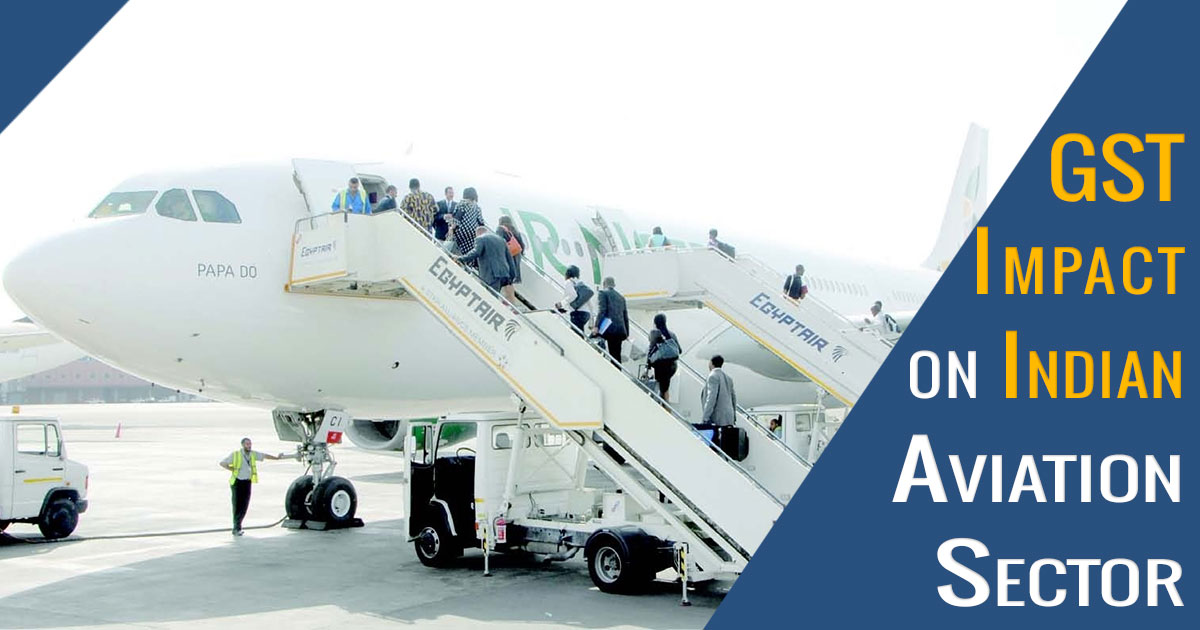
The implementation of the Goods and Services Tax (GST) Act has affected the growth of the aviation sector. Recently Aviation sector has been one of the growing sectors in India in the last decades. The Indian Aviation sector is ranked among the top ten markets in the world.
56th GST Council Meeting Update for the Indian Aviation Sector
| Entry | New GST Rate from 22nd September 2025 |
|---|---|
| Supply of Air transport of passengers in other than economy class | 18% with ITC |
| Aircraft for personal use | 40% |
| Unmanned aircraft | 5% |
Benefits and Drawbacks of GST Implementation in the Aviation Sector
We have summarised some of the important points of the aviation sector, including advantages and disadvantages in various aspects:
Decrease in Fare Prices of Economy Class Ticket
Air Travel is under a low service tax rate in the form of an abatement. Previously, the Service Tax rate on air travel tickets after abatement was 6% in the case of economy class and 9% in the case of business class. Whereas in GST, the Rate is 5% with input tax credit (ITC) in economy class and 18% with ITC in business class, which results in an excess burden of 3% on air travel tickets, adversely affecting the growth of the industry. This has increased ticket prices, which are impacting the cash flow.
Input cost of Jet Fuel /Aviation Turbine Fuel
Jet Fuel is outside the scope of the Structured GST Regime; therefore, credit of Tax paid on ATF is not allowed, which further increases the input cost, thereby increasing Ticket Prices.
Leasing of Aircraft
Under the financing lease agreement of the Aircraft, Service Tax was chargeable only on 10% of the lease rental value. This means there was a 90% abatement in the Leasing of Aircraft, and under the operating lease agreement, previously, customs duty was not leviable.
In the starting phase under GST, the cost of aircraft import under lease had increased as GST @ 5% is chargeable. But, because leasing reduces the cost of airline operations, the Revenue Department has pegged the IGST levy as ‘nil’ on aircraft imported on lease.
Repair and Maintenance
In the 39th GST council meeting, the Union Finance Minister Nirmala Sitharaman has reduced the GST rate of MRO services from the earlier 18% to now lesser 5% to give relief to the whole MRO industry under aviation. This might be given in the wake of the lesser flight business at the start of the year 2020.
Import of Aircraft and their spare parts
Lately, the import of aircraft and their spare parts has been exempted from customs duties. Under GST, there is an exemption on aircraft import via the leasing route. This move has brought great relief to the civil aviation industry by resolving the issue of double taxation.
Compliance Cost
Under the last Tax Law, only a single registration of service tax was required. Now, under GST, registration is required to take place in every state where a supply is made. Thus, a carrier has to register in every state where passengers are located and from where the flight embarks. The 56th GST Council meeting did not introduce any specific changes to the multi-state registration requirement for airlines. The challenge of compliance costs and interstate transfer of parts continues.